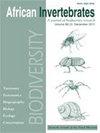Arboreal Herbivory by a Semi-Terrestrial South African Isopod Crustacean, Tylos capensis Krauss (Isopoda: Tylidae), on the Bietou Bush, Chrysanthemoides monilifera (L.) Norlindh
IF 1.1
4区 农林科学
Q3 ENTOMOLOGY
引用次数: 2
Abstract
ABSTRACT Most terrestrial isopods are ground-dwelling, scavenging detritivores, and rarely eat live vegetation. Here we report field and laboratory observations of the semi-terrestrial South African isopod, Tylos capensis Krauss, feeding above ground on live green leaves of the bietou bush, Chrysanthemoides monilifera (L.) Norlindh. The factors involved in the origin of this unusual arboreal feeding behavior are unknown, but we discuss three possible, not mutually exclusive, hypotheses that require testing: (1) Umhlanga beach, South Africa (our study site), provides insufficient detrital food to support the dense populations of T. capensis found in this area, thus causing these animals to seek out other food sources, (2) the relatively palatable and abundant C. monilifera leaves provide an easily accessible and digestible food source, and (3) few competing insect herbivores feed on C. monilifera leaves at Umhlanga beach, thus locally freeing up this resource for T. capensis.南非半陆生等足目甲壳动物Tylos capensis Krauss(等足目:Tylidae)在别头布什上的乔木草本植物
大多数陆生等足类动物是生活在地面的食腐动物,很少吃活的植被。本文报告了南非半陆生等足类动物Tylos capensis Krauss的野外和实验室观察结果,该动物在地面上以bietou灌木Chrysanthemoides monilifera (L.)的活绿叶为食。Norlindh。这种不寻常的树上进食行为的起源因素尚不清楚,但我们讨论了三种可能的,并非相互排斥的假设,需要测试:(1)南非Umhlanga海滩(我们的研究地点)提供的碎屑食物不足以支持该地区密集的capensis种群,从而导致这些动物寻找其他食物来源;(2)相对美味且丰富的C. monilifera叶片提供了易于获取和消化的食物来源;(3)Umhlanga海滩上很少有竞争的昆虫食草动物以C. monilifera叶片为食,从而为T. capensis释放了这一资源。
本文章由计算机程序翻译,如有差异,请以英文原文为准。
求助全文
约1分钟内获得全文
求助全文
来源期刊

African Invertebrates
生物-动物学
CiteScore
1.00
自引率
0.00%
发文量
6
审稿时长
>12 weeks
期刊介绍:
African Invertebrates is an international peer-reviewed, open-access journal that focuses primarily on the taxonomy, systematics, biogeography, and palaeontology of Afrotropical invertebrates, whether terrestrial, freshwater or marine. Aspects concerning biology, ecology, and conservation may also be considered where these relate to the primary focus areas. Papers dealing solely with biology, ecology, physiology, pests and pest control should be submitted elsewhere.
 求助内容:
求助内容: 应助结果提醒方式:
应助结果提醒方式:


